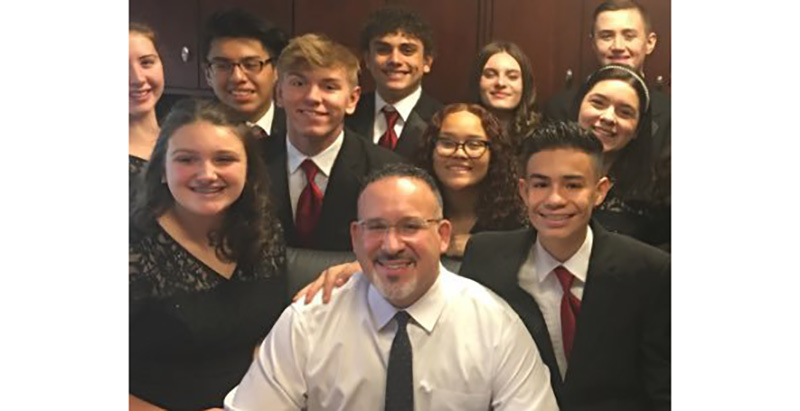Biden to Tap Miguel Cardona as Education Secretary — a ‘Big Picture Thinker’ Popular With Teachers Who Will Lead 2021 Push to Reopen Classrooms

Updated, Dec. 23
President-elect Joe Biden’s transition team announced late Tuesday that Connecticut Education Commissioner Miguel Cardona is the education secretary nominee. Biden will introduce Cardona at a live event in Wilmington, Delaware at 11:15 a.m. Dec. 23.
A little over a year ago, Miguel Cardona was an assistant superintendent of a 12-school district south of Hartford, Connecticut. Now that state’s education commissioner could be President-elect Joe Biden’s choice to lead the nation’s 131,000 public schools after months of closures that have left many children roughly more than a year behind in learning.
A graduate of the Meriden Public Schools, as well as a former elementary teacher and principal in the district, the Hispanic leader, who began school speaking no English himself, is viewed by some observers to still be close enough to the classroom to understand educators’ concerns.
“Teachers love him,” said Yale University professor Walter Gilliam, who participated in a school district conference earlier this year where Cardona was the keynote speaker. “The teachers and administrators at this conference on educational equity were so incredibly excited that he was there in their school district. The buzz there was like there was a rock star in their school auditorium.”
Biden has said he wants to open most schools in the first 100 days of his administration. According to The CT Mirror, Cardona’s record on that front has been mixed. Like most state chiefs, he’s been caught between the pleas of parents to return to in-person learning and the terms under which teachers are willing to get back in the classroom.
AFT President Randi Weingarten, who has worked with Cardona, said Tuesday that his “deep respect for educators and their unions will travel with him to Washington—and that commitment to collaboration is crucial to providing the resources and social and emotional supports to safely reopen schools.”
A focus on reducing achievement gaps is what stands out to those who don’t know him personally.
“He’s a lifelong public school educator who seems profoundly committed to equity,” said Morgan Polikoff, an education professor at the University of Southern California. “And he has a deep understanding of education policy and politics.”
Michelle Doucette Cunningham, executive director of the Connecticut After School Network, described Cardona as a “big picture thinker who understands systems,” but as a candidate with less experience than others Biden was considering. Those included former NEA president Lily Eskelsen Garcia, former Howard University Dean of Education Leslie Fenwick and Sharon Contreras, the Guilford County, North Carolina, schools superintendent,
Rumors that he was a top candidate for the position won praise from a Connecticut coalition of education organizations representing 60,000 teachers and non-certified personnel.
“He has been tested by the unprecedented upheaval caused by the pandemic. While this challenge has been a rocky road — and many issues remain unresolved — teachers and school support staff have appreciated his openness and collaboration,” according to their statement. “If selected as Secretary of Education, Dr. Cardona would be a positive force for public education — light years ahead of the dismal Betsy DeVos track record.”
The Congressional Hispanic Caucus also sent a letter to Biden expressing support for Cardona.
The state is considered by charter school advocates to have restrictions on growth and a weak accountability structure. Cardona, who has two children in public high schools, has not demonstrated opposition to charter schools, but said as commissioner he would focus on traditional public schools.
Jeanne Allen, CEO of the Center for Education Reform, said the choice of Cardona is, “good news for the millions of parents and students whose fates have been so derailed by the coronavirus this year. Had Biden picked a union leader or equivalent, it would have been akin to an act of war on the progress of the last three decades of pushing power to parents, and on those who have fought to get their kids educated this year, whether back in traditional schools or by their own hand.”
Weingarten also made a combat reference, saying, ““There is great potential for a renaissance in public education after years and years of the school wars.”
Cardona, she said, “won’t just repair the damage done—he’ll act to fulfill the promise and potential of public education and higher education as an opportunity agent for all students, regardless of demography or geography, knowing full well that doesn’t happen without resources and a deep respect for educators.”
Here are four other things to know about Biden’s potential nominee:
Reopening schools
The future education secretary would need to create a clearer path toward reopening, said Annette Campbell Anderson, an assistant professor at Johns Hopkins University who leads work on a state-by-state school reopening tracker.
“Districts and states have essentially been left to fend for themselves for the better part of a year, which has left a hodgepodge of unsustainable closure and reopening policies that are frustrating for all involved,” she said, adding that the department should create a federal data repository to track cases in schools, local positivity rates and vaccination rates. “The Biden administration has a short window to turn this around and they need to hit the ground running to ably establish their capacity.”
Focused on early childhood
While federal funding and oversight of early-childhood education programs is shared by the education and the health and human services departments, Cardona could bring increased attention to early learning. He served as co-chair of the Connecticut Birth to Grade Three Leaders Council, which focused on improving early-childhood education programs and children’s transition into school.
“He has collaborated well with our Office for Early Childhood so he would be great on child care and afterschool issues,” Cunningham said.
Supporter of bilingual education
Cardona, whose grandparents came to the U.S. from Puerto Rico, was an English learner when he started kindergarten. He holds a master’s degree in bilingual education, and when he became commissioner, he pledged to improve bilingual education in the state.
This year, Connecticut also became the first state to require high schools to offer courses in Black and Latino studies. “The fact is that more inclusive, culturally relevant content in classrooms leads to greater student engagement and better outcomes for all,” he said earlier this month when the announcement was made.
In his short time as chief, the Mirror reported, he has focused on the achievement gap between white and Hispanic students, and as a district-level leader in Meriden, he served as the first vice president of the Connecticut Association of Latino Administrators and Superintendents. The town where Cardona grew up is a working-class city in a state better known for its affluent suburbs and some of the widest achievement gaps in the country.
“Education is the great equalizer. It was for me,” said Cardona during his 2019 confirmation hearing. “Our success as a state will be dependent upon how we support students who are learning English as a second language.”
Since instruction went virtual in March, he has expressed particular concern over how English learners are faring in distance learning.
Opposes tying test scores to teacher evaluation
Since the passage of the Every Student Succeeds Act, many states have moved away from linking student test scores to evaluations of their teachers — an issue that made former Education Secretary Arne Duncan unpopular with the teachers unions.
In Connecticut, Cardona has been against using standardized test scores as one way to rate teachers. With Biden in favor of less testing, Cardona’s views on assessment will be closely examined. In October, the Connecticut Department of Education told districts to plan for administration of state tests in the spring of 2021, but that with U.S. Department of Education’s approval, the state wouldn’t use the results to identify struggling schools.
As secretary, Cardona would be in charge of determining how states will be held accountable even with the lack of assessment data.
Get stories like these delivered straight to your inbox. Sign up for The 74 Newsletter

;)

